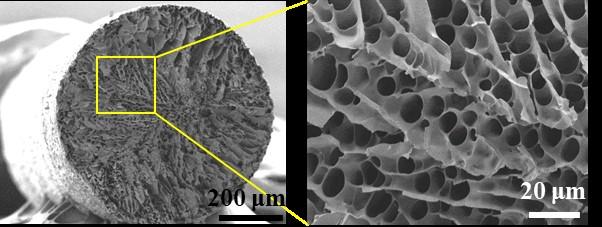
Credit: ACS Applied Materials & Interfaces 2020, DOI: 10.1021/acsami.0c02300
Imagine a single garment that could adapt to changing weather conditions, keeping its wearer cool in the heat of midday but warm when an evening storm blows in. In addition to wearing it outdoors, such clothing could also be worn indoors, drastically reducing the need for air conditioning or heat. Now, researchers reporting in ACS Applied Materials & Interfaces have made a strong, comfortable fabric that heats and cools skin, with no energy input.
“Smart textiles” that can warm or cool the wearer are nothing new, but typically, the same fabric cannot perform both functions. These textiles have other drawbacks, as well — they can be bulky, heavy, fragile and expensive. Many need an external power source. Guangming Tao and colleagues wanted to develop a more practical textile for personal thermal management that could overcome all of these limitations.
The researchers freeze-spun silk and chitosan, a material from the hard outer skeleton of shellfish, into colored fibers with porous microstructures. They filled the pores with polyethylene glycol (PEG), a phase-changing polymer that absorbs and releases thermal energy. Then, they coated the threads with polydimethylsiloxane to keep the liquid PEG from leaking out. The resulting fibers were strong, flexible and water-repellent. To test the fibers, the researchers wove them into a patch of fabric that they put into a polyester glove. When a person wearing the glove placed their hand in a hot chamber (122 F), the solid PEG absorbed heat from the environment, melting into a liquid and cooling the skin under the patch. Then, when the gloved hand moved to a cold (50 F) chamber, the PEG solidified, releasing heat and warming the skin. The process for making the fabric is compatible with the existing textile industry and could be scaled up for mass production, the researchers say.
###
The authors acknowledge funding from the National Natural Science Foundation of China and the WNLO Man-Machine Lab Fund.
The abstract that accompanies this paper can be viewed here.
The American Chemical Society (ACS) is a nonprofit organization chartered by the U.S. Congress. ACS’ mission is to advance the broader chemistry enterprise and its practitioners for the benefit of Earth and its people. The Society is a global leader in providing access to chemistry-related information and research through its multiple research solutions, peer-reviewed journals, scientific conferences, eBooks and weekly news periodical Chemical & Engineering News. ACS journals are among the most cited, most trusted and most read within the scientific literature; however, ACS itself does not conduct chemical research. As a specialist in scientific information solutions (including SciFinder® and STN®), its CAS division powers global research, discovery and innovation. ACS’ main offices are in Washington, D.C., and Columbus, Ohio.
To automatically receive news releases from the American Chemical Society, contact [email protected].
Follow us: Twitter | Facebook
Media Contact
Katie Cottingham
[email protected]
Related Journal Article
http://dx.



